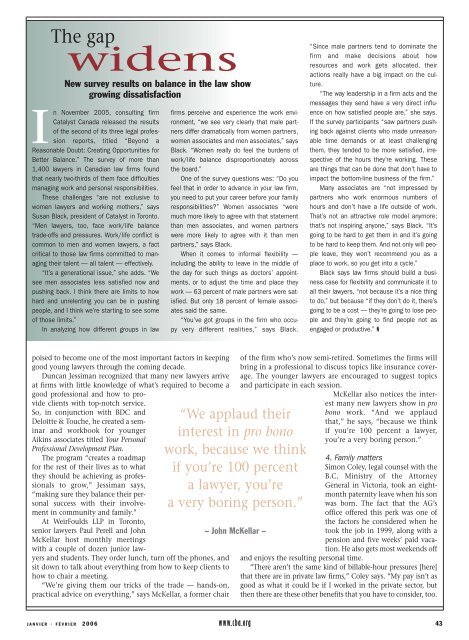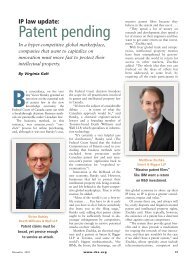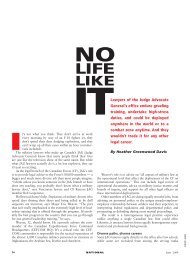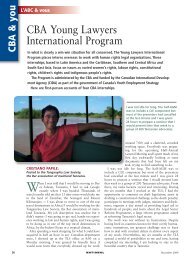The Canadian Bar Association - National (English) - July/August 2012
The Canadian Bar Association - National (English) - July/August 2012
The Canadian Bar Association - National (English) - July/August 2012
You also want an ePaper? Increase the reach of your titles
YUMPU automatically turns print PDFs into web optimized ePapers that Google loves.
<strong>The</strong> gap<br />
widens<br />
New survey results on balance in the law show<br />
growing dissatisfaction<br />
In November 2005, consulting firm<br />
Catalyst Canada released the results<br />
of the second of its three legal profession<br />
reports, titled “Beyond a<br />
Reasonable Doubt: Creating Opportunities for<br />
Better Balance.” <strong>The</strong> survey of more than<br />
1,400 lawyers in <strong>Canadian</strong> law firms found<br />
that nearly two-thirds of them face difficulties<br />
managing work and personal responsibilities.<br />
<strong>The</strong>se challenges “are not exclusive to<br />
women lawyers and working mothers,” says<br />
Susan Black, president of Catalyst in Toronto.<br />
“Men lawyers, too, face work/life balance<br />
trade-offs and pressures. Work/life conflict is<br />
common to men and women lawyers, a fact<br />
critical to those law firms committed to managing<br />
their talent — all talent — effectively.<br />
“It’s a generational issue,” she adds. “We<br />
see men associates less satisfied now and<br />
pushing back. I think there are limits to how<br />
hard and unrelenting you can be in pushing<br />
people, and I think we’re starting to see some<br />
of those limits.”<br />
In analyzing how different groups in law<br />
poised to become one of the most important factors in keeping<br />
good young lawyers through the coming decade.<br />
Duncan Jessiman recognized that many new lawyers arrive<br />
at firms with little knowledge of what’s required to become a<br />
good professional and how to provide<br />
clients with top-notch service.<br />
So, in conjunction with BDC and<br />
Deloitte & Touche, he created a seminar<br />
and workbook for younger<br />
Aikins associates titled Your Personal<br />
Professional Development Plan.<br />
<strong>The</strong> program “creates a roadmap<br />
for the rest of their lives as to what<br />
they should be achieving as professionals<br />
to grow,” Jessiman says,<br />
“making sure they balance their personal<br />
success with their involvement<br />
in community and family.”<br />
At WeirFoulds LLP in Toronto,<br />
senior lawyers Paul Perell and John<br />
McKellar host monthly meetings<br />
with a couple of dozen junior lawyers<br />
and students. <strong>The</strong>y order lunch, turn off the phones, and<br />
sit down to talk about everything from how to keep clients to<br />
how to chair a meeting.<br />
“We’re giving them our tricks of the trade — hands-on,<br />
practical advice on everything,” says McKellar, a former chair<br />
firms perceive and experience the work environment,<br />
“we see very clearly that male partners<br />
differ dramatically from women partners,<br />
women associates and men associates,” says<br />
Black. “Women really do feel the burdens of<br />
work/life balance disproportionately across<br />
the board.”<br />
One of the survey questions was: “Do you<br />
feel that in order to advance in your law firm,<br />
you need to put your career before your family<br />
responsibilities?” Women associates “were<br />
much more likely to agree with that statement<br />
than men associates, and women partners<br />
were more likely to agree with it than men<br />
partners,” says Black.<br />
When it comes to informal flexibility —<br />
including the ability to leave in the middle of<br />
the day for such things as doctors’ appointments,<br />
or to adjust the time and place they<br />
work — 63 percent of male partners were satisfied.<br />
But only 18 percent of female associates<br />
said the same.<br />
“You’ve got groups in the firm who occupy<br />
very different realities,” says Black.<br />
“We applaud their<br />
interest in pro bono<br />
work, because we think<br />
if you’re 100 percent<br />
a lawyer, you’re<br />
a very boring person.”<br />
– John McKellar –<br />
JANVIER · FÉVRIER 2006 www.cba.org<br />
“Since male partners tend to dominate the<br />
firm and make decisions about how<br />
resources and work gets allocated, their<br />
actions really have a big impact on the culture.<br />
“<strong>The</strong> way leadership in a firm acts and the<br />
messages they send have a very direct influence<br />
on how satisfied people are,” she says.<br />
If the survey participants “saw partners pushing<br />
back against clients who made unreasonable<br />
time demands or at least challenging<br />
them, they tended to be more satisfied, irrespective<br />
of the hours they’re working. <strong>The</strong>se<br />
are things that can be done that don’t have to<br />
impact the bottom-line business of the firm.”<br />
Many associates are “not impressed by<br />
partners who work enormous numbers of<br />
hours and don’t have a life outside of work.<br />
That’s not an attractive role model anymore;<br />
that’s not inspiring anyone,” says Black. “It’s<br />
going to be hard to get them in and it’s going<br />
to be hard to keep them. And not only will people<br />
leave, they won’t recommend you as a<br />
place to work, so you get into a cycle.”<br />
Black says law firms should build a business<br />
case for flexibility and communicate it to<br />
all their lawyers, “not because it’s a nice thing<br />
to do,” but because “if they don’t do it, there’s<br />
going to be a cost — they’re going to lose people<br />
and they’re going to find people not as<br />
engaged or productive.” N<br />
of the firm who’s now semi-retired. Sometimes the firms will<br />
bring in a professional to discuss topics like insurance coverage.<br />
<strong>The</strong> younger lawyers are encouraged to suggest topics<br />
and participate in each session.<br />
McKellar also notices the interest<br />
many new lawyers show in pro<br />
bono work. “And we applaud<br />
that,” he says, “because we think<br />
if you’re 100 percent a lawyer,<br />
you’re a very boring person.”<br />
4. Family matters<br />
Simon Coley, legal counsel with the<br />
B.C. Ministry of the Attorney<br />
General in Victoria, took an eightmonth<br />
paternity leave when his son<br />
was born. <strong>The</strong> fact that the AG’s<br />
office offered this perk was one of<br />
the factors he considered when he<br />
took the job in 1999, along with a<br />
pension and five weeks’ paid vacation.<br />
He also gets most weekends off<br />
and enjoys the resulting personal time.<br />
“<strong>The</strong>re aren’t the same kind of billable-hour pressures [here]<br />
that there are in private law firms,” Coley says. “My pay isn’t as<br />
good as what it could be if I worked in the private sector, but<br />
then there are these other benefits that you have to consider, too.<br />
43








